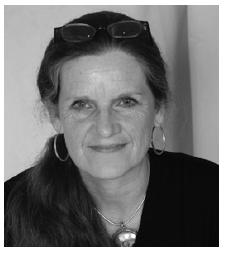The Paper House (10 page)

She would go to art classes. Just like Rasul said. Like it said in the newspaper that she would keep in her special tin under the bed.
But what if she didn't want to be an artist?
Safiyah linked arms with Pendo and said, “I want to show you something.” She led her friend to the picture of medical instruments. She pointed out the stethoscope and told Pendo how she might be a nurse instead of an artist, so she could help the sick people who crowded the beds and the floor and the courtyard of the clinic.
But first she would go to school. Where she would learn to read.
Safiyah and Pendo spent a long time looking at the newspaper pictures and studying every inch of the mural on the walls of the paper house.
Later, while Cucu heated soup on the little stove, they sat together outside and listened to the noises of Kibera swirling all around. They looked across the roofs at the birds chattering on the power lines.
Behind them, the house blazed with shapes and colors, telling the story of Safiyah's life here and back in her old home.
“Tell me again what it says in the paper,” said Safiyah. She tipped her head against Pendo's shoulder as she imagined them walking together to school in matching red sweaters and blue skirts. She would learn to read and write like Pendoâand Chidi. She would grow up to be an artist or a nurse or even a doctor, so that one day she could earn enough money for a better house in the city. Or so that she and Cucu could return to their village to help the people left behind.
Until then, with friends and neighbors like Mrs. Pakua and Rasulâand even little pest Chidiâlife here was not so bad. Safiyah closed her eyes as she listened to her best friend Pendo read words that one day she would be able to read herself, about their new life in Kibera and the paper house they were all so proud of.
A few facts about life in an African slum
Kibera is a slum on the outskirts of Nairobi, Kenya.
As many as half a million people may live there, most without running water, electricity or bathrooms.
Many have been forced to leave their villages by drought, which causes crop failure and starvation. They come to the city looking for work. But there is never enough work for everyone.
Many Kenyan children have lost at least one relative to AIDS. Many live with a grandparent, aunt or uncle and other family members. Tuberculosis and pneumonia are other serious diseases that affect people in the slums.
Not all children can afford to go to school. But many are helped with money donated by people in other countries.
Despite their poverty, the people of Kibera have schools, churches, clinics and community centers. Children play, neighbors get to know each other and people organize ways to help those most in need.
For many people, life in the slum may be the only one they will ever know. But those with a good education have the best chance of making a better life.
Mancala, one of the oldest games in the world, is played by adults and children all over Africa and in many other countries.
Ten percent of author royalties from the sale of
The Paper House
will be donated to Kibera's Red Rose School, Nairobi through The Children of Kibera Foundation at
www.childrenofkibera.org
.
No idea goes anywhere without the wonderful input from my husband Douglas Brunt. And my dream editor, Sarah Harvey, helps me get the story right. Then there are all my writing peers who cheer me on, and the readers who send me wonderful letters. Without them all, I would be writing in the dark.

Lois Peterson wrote short stories and articles for adults for twenty years before writing
Meeting Miss 405,
her first novel for children. Her next children's book was
The Ballad of Knuckles McGraw
, followed by
Silver
Rain
. She was born in England, and has lived in Iraq, France and the United States. She now lives in Surrey, British Columbia, where she works in a public library, writes, reads and teaches creative writing to adults, teens and children.